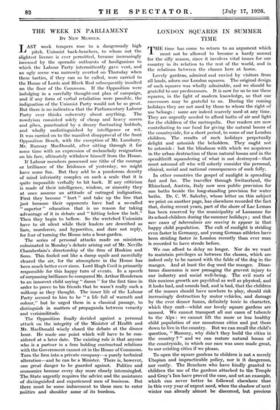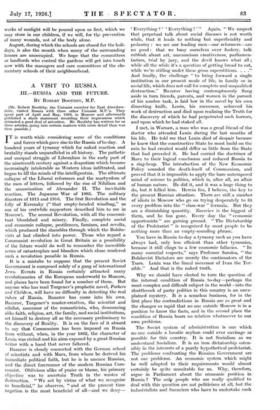LONDON SQUARES IN SUMMER TIME
THE time has come to return to an argument which must not be allowed to become a hardy annual for the silly season, since it involves vital issues for our country in its relation to the rest of the world, and in the relations between the classes here at home.
Lovely gardens, admired and envied by visitors from all lands, adorn our London squares. The original design of such squares was wholly admirable, and we should be grateful to our predecessors. It is now for us to use these squares, in the light of modern knowledge, so that our successors may be grateful to us. During the coming holidays they are not used by those to whom the right of use belongs : some are indeed scarcely used at any time.
They are urgently needed to afford baths of air and light for the children of the metropolis. Our readers are now contributing to our fund for giving the natural boons of the countryside, for a short period, to some of our London children. The results of such holidays perpetually delight and astonish the beholders. They ought not to astonish : but the blindness with which we acquiesce in the urban destruction of these natural boons and in the spendthrift squandering of what is not destroyed—that must astound all who will soberly consider the personal, clinical, social and national consequences of such folly.
In other countries the gospel of sunlight is spreading fast and far. The traveller through Switzerland, the Rhineland, Austria, Italy now sees public provision for sun baths beside the long-standing provision for water baths. Dr. C. W. Saleeby, whose letter on this subject we print on another page, has elsewhere recorded the fact that, during recent years, part of the shore of Lac Leman has been reserved by the municipality of Lausanne for its school-children during the summer holidays ; and that nev cases of tuberculosis are ceasing to appear in that happy child population. The cult of sunlight is striding even faster in Germany, and young German athletes have been striding faster in London recently than ever man is recorded to have strode before.
We can afford to delay no longer. Nor do we want to maintain privileges as between the classes, which are indeed only to be named with the fable of the dog in the manger. And at least the dog used the manger. Disas- trous dissension is now presaging the gravest injury to our industry and social well-being. The evil roots of this noxious growth are psychical as well as physical, and it looks bad, and sounds bad, and is bad, that the children of the masses should have nowhere to play, should risk increasingly destruction by motor vehicles, and damage by the ever denser fumes, definitely toxic in character, which they emit—whilst our lovely square gardens are unused. We cannot transport all our cases of tubercle to the Alps : we cannot lift the more or less healthy child population of our monstrous cities and put them down to live in the country. But we can recall the child's question, " Mummy, why didn't they build the cities in the country ? " and we can restore natural boons of the countryside, in which our race was once made great, to our existing cities if we please.
To open the square gardens to children is not a merely Utopian and impracticable policy, nor is it dangerous, nor costly. The Benchers who have kindly granted to children the use of the gardens attached to the Temple and Gray's Inn have proved the case, and set an example, which can never better be followed elsewhere than in this very year of urgent need, when the shadow of next winter can already almost be discerned, but precious weeks of sunlight will be poured upon us first, which we may store in our children, if we. will, for the prevention of many wounds, not of the body alone.
August, during which the schools are closed for the holi- days, is also the month when many of the surrounding houses are unoccupied. We hope that the committees or landlords who control the gardens will get into touch now with the managers and care committees of the ele- mentary schools of their neighbourhood.











































 Previous page
Previous page